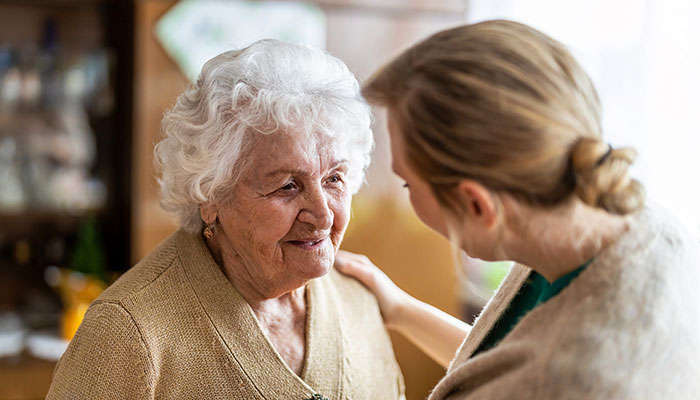Alzheimer’s and other dementias

“There is an art to caring for a person with dementia. We hire caregivers with intuition and big hearts. They can work with people who no longer have the ability to think logically or remember. People with Alzheimer’s are often scared and confused. Our caregivers use strategies to calm your loved one’s distress and reduce difficult behaviors such as sundown syndrome, emotional outbursts, and wandering.”
—Brian Gauthier, gerontologist, owner of A Family Member HomeCare
We have caregivers who understand the needs of people with Alzheimer’s, vascular dementia, Parkinson’s dementia, and other dementias. There are stages of dementia each with its own abilities and areas where more support is needed. Our in-home caregivers focus on providing opportunities for engagement and activity that are appropriate for your loved one’s stage.
Are you ready for state-of-the-art care?
Give us a call at 1-866-Brian-XO (866-274-2696).
Early stage of dementia
People with dementia may have problems thinking and remembering and behaving logically. But they still need their dignity and to have as much independence and control as is safely possible. This is especially true for mild cognitive impairment (MCI) and the early stage of a dementia illness. It’s a balancing act.
In the early stages, our caregivers provide simple choices whenever possible. They set up the home environment for success, for instance, to reduce falls or accidents getting to the toilet.
Return to top
Middle stage of dementia
Our caregivers are skilled in techniques to prevent or reduce common problems:
- They know redirection strategies for emotional outbursts. They observe triggers and create a routine to avoid them.
- They create a calm, quiet, uncluttered atmosphere so your loved one is not overstimulated.
- They encourage physical exercise when possible. And they are always on the lookout for purposeful activities. People with dementia want to be useful (folding towels, sanding wood). Appropriate stimulation and activity will also help reduce wandering.
- They know how to avoid sundown syndrome, pulling the shades and turning on lights in the midafternoon to preclude the distress of evening and nighttime.
- They are sensitive to emotional mirroring, striving to express a sunny attitude to help your loved one stay upbeat and positive.
Return to top
Late stage of dementia
Our caregivers know how to adapt to reduced abilities so your loved one can be as happy and engaged as possible.
- They harness the five senses—touch, taste, smell, sight, and hearing. From rubbing lotions on the skin to cuddling stuffed animals, they focus on calming activities that do not overstimulate.
- Music is a universal language and one that seems to bring joy even when your loved one has lost the ability to speak or understand words.
- Many people with dementia find the shower frightening or don’t like the cold from being wet. As a result, they resist bathing. Basic hygiene becomes a problem. Our caregivers use techniques that can make bathing easier and more pleasant.
- Eating proves more challenging in the later stages. Our caregivers can make meals more enticing by focusing on finger foods when the use of forks and spoons becomes too difficult. They also know strategies such as using high-contrast table settings: A white plate on a dark tablecloth when dark food is being served.
For those in the middle and later stages of dementia, it may be necessary to provide 24-hour home care. We can make arrangements for live-in care or for hourly support.
If your loved one has dementia, come to the home care company that truly understands how to tailor care to each stage of the disease. Give us a call at 1-866-Brian-XO (866-274-2696).
Return to top



